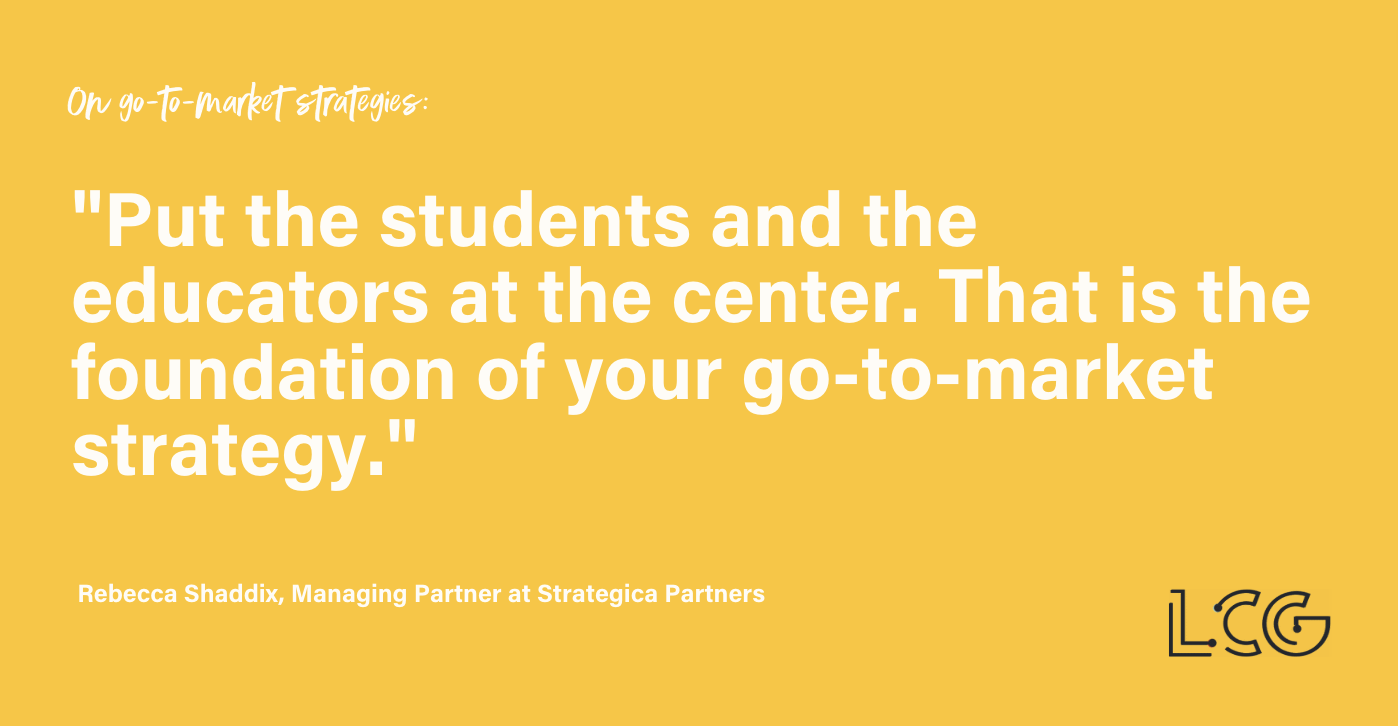What is go-to-market (GTM) strategy, and why do you need one if you're serious about marketing anything? Elana sits down with Rebecca Shaddix, a marketing expert with a passion for education, to look at the basics of identifying your market and crafting a message that will speak directly to the needs of your target audience.
If you're an EdTech company, this episode is not to be missed. If you're an educator, this episode may be particularly helpful if you’re looking to familiarize yourself within the space of EdTech marketing or may be thinking about transitioning into the EdTech space.
Marketing Is About The End Users As Well As The Product.
Rebecca explains how GTM begins with identifying who would be the most interested in the product:
"Find what our market is, but equally importantly, what it isn't. There's a specific application that we are best positioned to fill."
Even when you believe that you have a product-market fit, your GTM strategy almost always starts with working backward from the ideal end users by finding the answers to questions like:
"Who are we trying to reach? What do they care the most about? How are they solving these problems now? Where can we reach them?"
Asking "Where can we reach them?" introduces channel-market fit, and as Rebecca points out, that's something different from product-market fit. Until you know enough about your buyers to also know the best channels for getting their attention, you risk sending out a marketing message that they might not even notice.
Create A Detailed Map Of The Buyer's Journey.
Identifying your audience requires gathering data through market research. As you assemble that data, you can begin to construct buyer personas. Rebecca explains:
"We want to understand what their pain points are, how they are actually interacting with the world today without our product. Those are the customers that we need to convert."
It's important that we avoid making assumptions about our prospective buyers from incomplete or unexamined data, because if we misunderstand the buyers' journey, we're less likely to speak effectively to their needs. Rebecca says:
"We really want to understand these power users. It's about really analyzing those cohorts to understand who would be most upset if your product disappeared, because those are the ones that we want to replicate."
EdTech Isn't Like Other Markets.
Applying any GTM strategy to EdTech products will involve additional layers of complexity. For one thing, the buyer (such as a school district) may be different from the end users (such as teachers and students). Even more importantly, Rebecca notes that the education sector is an ecosystem as well as a market. This puts the EdTech industry in the role of leveraging its product development and outreach to bring innovation and pedagogical value to the world of learning. She sums it up this way:
"Not any one of us is on an island. This is an ecosystem that has to really think about serving each other first, and that's where the rewards come from. If you put the students and the educators at the center of any of this, that is essentially the foundation of your go-to-market strategy."
Here's the full transcript of Rebecca’s podcast episode.
What We Talked About
Use this to jump to parts of the conversation you want to listen to more closely
[1:42] How Elana met Rebecca, illustrating the power of social media
[6:05] What a go-to-market plan actually is
"Marketing that makes you say, 'That's good marketing' isn't the goal, right? It's, 'Oh, I need that, oh, I want to buy that.'"
[11:06] What's unique about marketing in the EdTech industry
"There really is no EdTech go-to-market playbook that will work for all products all the time."
[15:35] The first steps of a go-to-market plan
“What is a sample journey of how somebody would really find your product?"
[20:54] EdTech marketing: B2B or B2C?
"Users versus buyers versus customers are not interchangeable terms. So users may be teachers. They may be students. Their happiness is really important for retention and re-engagement."
[27:25] Common mistakes around developing a go-to-market plan
"The way we want to set a go-to-market strategy is by making our objectives very clear, then defining the strategies to get there, and then implementing the tactics."
[34:42] Helping educators understand the EdTech sector
"Removing your ego, removing any attachment to the answers, not correcting people when they don't know how to use something, all of these are factors that go into the go-to-market research that make it much more effective."
[39:33] Grasping the basics of marketing
"Even if you or I say the exact same thing that a customer says, it's more credible coming from them."
[42:37] Staying inspired
[44:24] How to get in touch with Rebecca
Resources Mentioned in this Episode:
GTM Resources
User Research: A Practical Guide to Designing Better Products and Services by Stephanie Marsh, Rebecca suggests this book as a beginning primer for anyone interested in marketing
The Wolf of Wall Street, Rebecca mentions this 2013 film because of a scene that clearly illustrates GTM strategy
More EdTech Resources
Understanding the EdTech Industry: A Conversation with Sandro Olivieri, LCG's podcast featuring a high profile EdTech entrepreneur
Project FoundED, a community of EdTech founders providing resources and support; Elana mentioned this while identifying Sandro Olivieri
Navigating EdTech Purchasing, Procurement, and Pilots: A Conversation With Rayna (Yaker) Glumac, Elana refers to the explanation about how EdTech developers can empower educators
What's it Really Like to Teach in a Pandemic: A Conversation With Tracy Selock, Elana refers to the importance of educators setting boundaries
ABL Schools, an education software and services company, Elana's former client
All Things Rebecca
Strategica Partners, an award-winning go-to-market strategy firm; Rebecca previously served as Managing Partner
Girl Develop It, a nonprofit that helps women and non-binary adults transition into technical careers; Rebecca chairs the Board of Directors
Rebecca's Forbes contributions, Rebecca contributes regular pieces about societal implications of advancements in the tech sector
Elana Leoni, Host
Elana Leoni has dedicated the majority of her career to improving K-12 education. Prior to founding LCG, she spent eight years leading the marketing and community strategy for the George Lucas Educational Foundation where she grew Edutopia’s social media presence exponentially to reach over 20 million education change-makers every month.
Rebecca Shaddix, Guest
Rebecca Shaddix is the Managing Partner at Strategica Partners, an award-winning international consulting group focusing on a strategic, financial, environmental and human perspectives. She was recognized as the Los Angeles Business Journal’s Rising Star of 2019 for her track record of growing startups.
As a Forbes Contributor, she writes about societal implications of advancements in the tech sector, and led the Digital Technologies Initiative at the UCLA Luskin Center for Innovation - launching its Women in Tech research initiative.
Rebecca is the Chair of the Board of Directors of Girl Develop It, a non-profit organization that helps women and non-binary adults transition into technical careers.
She previously served as VP of Marketing at Curious Cardinals, which pairs K-12 students with college mentors to develop the skills they'll need to become creative and confident lifelong learners. She also led marketing as Director of Marketing at GoGuardian, which Inc. 5000 calls the fastest-growing education company in U.S. history.
Rebecca is an alumna of UCLA and the UCLA Anderson School of Management.
About All Things Marketing and Education
What if marketing was judged solely by the level of value it brings to its audience? Welcome to All Things Marketing and Education, a podcast that lives at the intersection of marketing and you guessed it, education. Each week, Elana Leoni, CEO of Leoni Consulting Group, highlights innovative social media marketing, community-building, and content marketing strategies that can significantly increase reach, relationships, and revenue.
Rate, Like, and Subscribe
Let us know what you thought about this episode by rating and reviewing our podcast. Click here, scroll to the bottom, tap to rate with five stars, and select “Write a Review.” Then be sure to let us know what you loved most about the episode! Also, if you haven’t done so already, subscribe to the podcast to be notified when we have more content to share with you.





